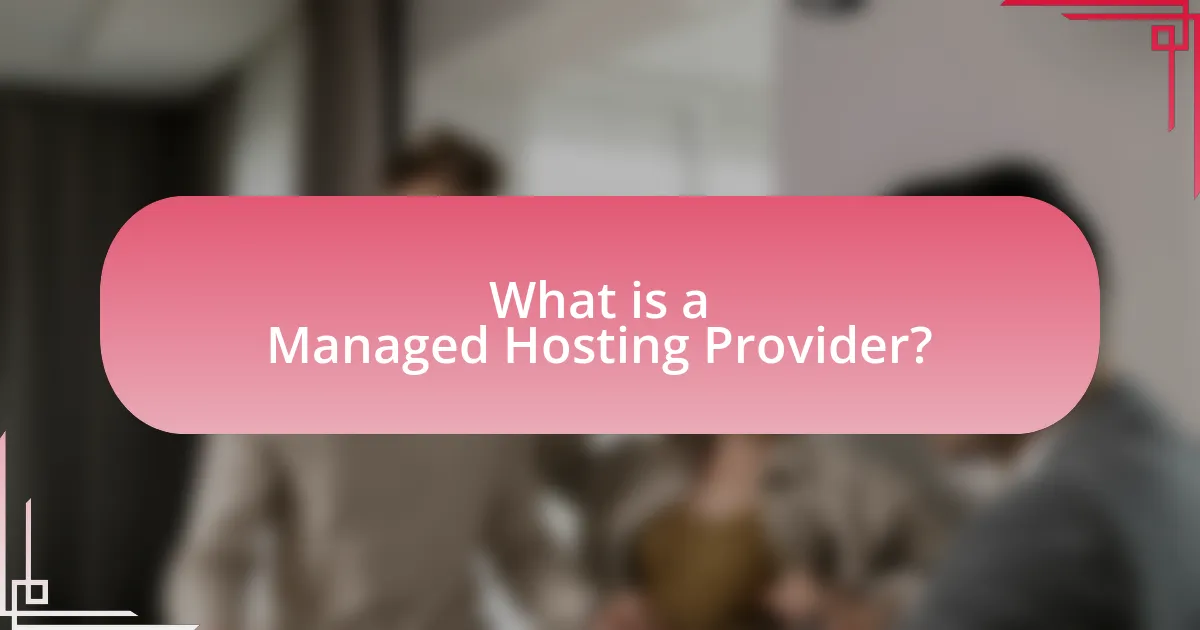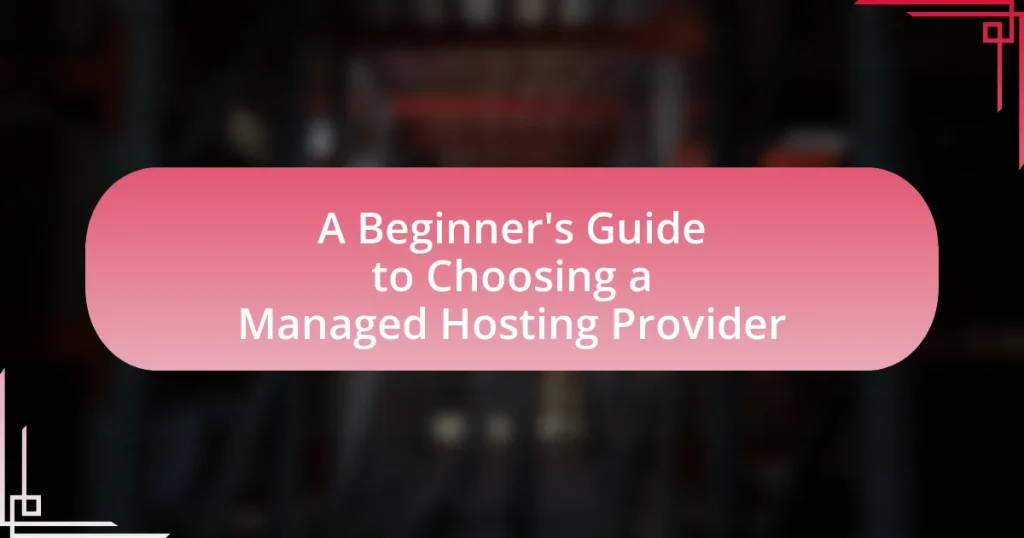A Managed Hosting Provider is a company that offers dedicated server resources and comprehensive management services, allowing businesses to focus on their core operations without needing extensive IT knowledge. This article provides a detailed guide for beginners on selecting a Managed Hosting Provider, highlighting the differences between managed and traditional hosting, the services typically included, and the key benefits such as enhanced security and expert support. It also discusses important factors to consider, including customer support, pricing, and performance metrics, while outlining common pitfalls to avoid and best practices for effective collaboration with the provider.

What is a Managed Hosting Provider?
A Managed Hosting Provider is a company that offers dedicated server resources and management services for clients, ensuring that all technical aspects of hosting are handled by the provider. This includes server setup, maintenance, security, and support, allowing businesses to focus on their core operations without needing extensive IT knowledge. Managed Hosting Providers typically offer services such as regular backups, software updates, and performance monitoring, which enhance reliability and security for hosted applications. According to a report by MarketsandMarkets, the managed hosting services market is projected to grow significantly, indicating the increasing reliance on these providers for efficient and secure hosting solutions.
How does a Managed Hosting Provider differ from traditional hosting?
A Managed Hosting Provider differs from traditional hosting primarily in the level of service and management offered. Managed hosting includes comprehensive support, where the provider takes care of server management, maintenance, security, and backups, allowing clients to focus on their core business activities. In contrast, traditional hosting typically requires users to manage their own servers, including software updates and security measures, which can lead to increased complexity and potential vulnerabilities. This distinction is significant, as studies show that businesses using managed hosting experience 50% less downtime and improved performance due to the proactive management and expertise provided by managed hosting services.
What services are typically included in managed hosting?
Managed hosting typically includes services such as server management, security monitoring, data backup, software updates, and technical support. These services ensure that the hosting environment is optimized for performance and security, allowing businesses to focus on their core operations without worrying about server maintenance. For instance, server management involves configuring and maintaining the server hardware and software, while security monitoring protects against potential threats. Data backup services provide regular backups to prevent data loss, and software updates ensure that applications run smoothly and securely. Technical support is available to assist with any issues that may arise, providing peace of mind for users.
Why might a business choose managed hosting over other options?
A business might choose managed hosting over other options primarily for enhanced reliability and support. Managed hosting services provide dedicated resources, expert management, and proactive monitoring, which significantly reduce downtime and technical issues. According to a study by HostingAdvice, 99.9% uptime is often guaranteed by managed hosting providers, ensuring that businesses can maintain consistent online presence and performance. Additionally, the availability of 24/7 technical support allows businesses to resolve issues quickly, minimizing potential revenue loss and improving overall operational efficiency.
What are the key benefits of using a Managed Hosting Provider?
The key benefits of using a Managed Hosting Provider include enhanced security, expert support, and improved performance. Managed Hosting Providers offer robust security measures, such as firewalls and regular updates, which protect against cyber threats. Additionally, they provide 24/7 expert support, ensuring that technical issues are resolved quickly, minimizing downtime. Furthermore, these providers optimize server performance through resource management and load balancing, leading to faster website loading times. According to a study by HostingAdvice, businesses using managed hosting experience 99.9% uptime, significantly reducing the risk of revenue loss due to outages.
How does managed hosting enhance website performance?
Managed hosting enhances website performance by providing dedicated resources and expert management tailored to specific needs. This setup ensures optimal server configurations, faster load times, and reduced downtime, as resources are not shared with other users. Additionally, managed hosting often includes performance monitoring and optimization tools, which help identify and resolve issues proactively. According to a study by Google, a one-second delay in page load time can lead to a 20% decrease in conversions, highlighting the critical role of performance in user experience and business outcomes.
What security features are offered by managed hosting providers?
Managed hosting providers offer a range of security features designed to protect client data and ensure system integrity. These features typically include firewalls, which monitor and control incoming and outgoing network traffic based on predetermined security rules; DDoS protection, which safeguards against distributed denial-of-service attacks; and regular security updates and patch management to address vulnerabilities in software. Additionally, managed hosting services often provide data encryption, both in transit and at rest, to secure sensitive information from unauthorized access. Many providers also implement intrusion detection and prevention systems (IDPS) to identify and respond to potential threats in real-time. These security measures are essential for maintaining compliance with industry standards and regulations, such as GDPR and PCI DSS, which require robust data protection practices.

What factors should beginners consider when choosing a Managed Hosting Provider?
When choosing a Managed Hosting Provider, beginners should consider factors such as reliability, customer support, scalability, security features, and pricing. Reliability is crucial as it ensures minimal downtime; for instance, providers with a 99.9% uptime guarantee are preferable. Customer support should be accessible 24/7, as timely assistance is vital for resolving issues. Scalability allows businesses to grow without switching providers, making it essential for future needs. Security features, including SSL certificates and regular backups, protect data from breaches. Lastly, pricing should align with the budget while offering value for the services provided, ensuring that the chosen provider meets both current and future requirements effectively.
How important is customer support in selecting a managed hosting provider?
Customer support is crucial in selecting a managed hosting provider. Effective customer support ensures that any technical issues or inquiries are addressed promptly, minimizing downtime and enhancing user experience. According to a survey by the IT service management company, ServiceNow, 70% of customers consider responsive support as a key factor in their satisfaction with a service provider. Additionally, managed hosting often involves complex configurations and maintenance, making reliable support essential for businesses that lack in-house expertise. Therefore, strong customer support directly impacts the overall effectiveness and reliability of the managed hosting service.
What types of customer support should you expect?
You should expect several types of customer support when choosing a managed hosting provider, including 24/7 technical support, live chat assistance, email support, and phone support. These support options ensure that customers can receive help at any time, addressing issues related to server management, website performance, and security. For instance, 24/7 technical support is crucial for minimizing downtime, as studies show that even a minute of downtime can cost businesses significant revenue. Additionally, live chat assistance allows for quick resolution of minor issues, enhancing customer satisfaction.
How can customer reviews help in the decision-making process?
Customer reviews significantly aid in the decision-making process by providing firsthand insights into the experiences of other users. These reviews offer valuable information regarding the reliability, performance, and customer service of managed hosting providers, which can influence potential customers’ choices. Research indicates that 79% of consumers trust online reviews as much as personal recommendations, highlighting their impact on purchasing decisions. Additionally, platforms like Trustpilot and Google Reviews aggregate user feedback, allowing prospective clients to compare different providers based on real user experiences, thus facilitating informed decisions.
What role does pricing play in choosing a Managed Hosting Provider?
Pricing is a critical factor in selecting a Managed Hosting Provider, as it directly influences the overall budget and value received from the service. Managed hosting services typically offer various pricing tiers based on features, performance, and support levels, allowing businesses to align their hosting solutions with their financial capabilities. For instance, a study by HostingAdvice found that the average cost of managed hosting ranges from $30 to $500 per month, depending on the complexity and resources required. This pricing structure helps businesses assess which provider offers the best balance of cost and necessary features, ensuring they do not overspend while still meeting their operational needs.
How can you compare pricing models among different providers?
To compare pricing models among different providers, analyze the structure of each model, including fixed pricing, tiered pricing, and pay-as-you-go options. Each model has distinct implications for cost management; for instance, fixed pricing offers predictability, while pay-as-you-go can be more flexible but may lead to variable costs. Additionally, evaluate included services such as support, bandwidth, and storage, as these can significantly affect overall value. Research shows that providers with transparent pricing structures tend to have higher customer satisfaction rates, indicating that clarity in pricing can be a key factor in decision-making.
What hidden costs should you be aware of?
Hidden costs in managed hosting can include setup fees, data transfer charges, and additional costs for backups or security features. Setup fees may be charged for initial configuration, which can range from $50 to several hundred dollars depending on the provider. Data transfer charges can apply if your website exceeds the allocated bandwidth, often leading to unexpected monthly bills. Additionally, while some security features may be included, advanced options like DDoS protection or SSL certificates often incur extra fees. Understanding these potential costs is crucial for budgeting effectively when selecting a managed hosting provider.

How can you evaluate the performance of a Managed Hosting Provider?
To evaluate the performance of a Managed Hosting Provider, assess key metrics such as uptime, response time, and customer support quality. Uptime should ideally be 99.9% or higher, as this indicates reliability; for instance, a provider with a proven track record of uptime can significantly reduce downtime-related losses for businesses. Response time is critical; a good provider typically offers response times under 200 milliseconds, which enhances user experience. Additionally, evaluate customer support by checking availability (24/7 support is preferable) and responsiveness, as evidenced by customer reviews and service level agreements (SLAs). These metrics collectively provide a comprehensive view of a provider’s performance.
What metrics should you consider when assessing performance?
When assessing performance, key metrics to consider include uptime, response time, and resource utilization. Uptime measures the percentage of time a service is operational, with a standard target being 99.9% or higher, indicating reliability. Response time evaluates how quickly a server processes requests, ideally under 200 milliseconds for optimal user experience. Resource utilization tracks the consumption of CPU, memory, and bandwidth, ensuring that the hosting environment can handle traffic without degradation of service. These metrics collectively provide a comprehensive view of a managed hosting provider’s performance capabilities.
How does uptime affect your website’s reliability?
Uptime directly impacts a website’s reliability by determining the percentage of time the site is operational and accessible to users. High uptime, typically above 99.9%, ensures that visitors can consistently access the website without interruptions, which builds trust and enhances user experience. Conversely, low uptime can lead to frequent outages, resulting in lost traffic, decreased customer satisfaction, and potential revenue loss. For instance, a study by Gartner indicates that even a single hour of downtime can cost businesses thousands of dollars, emphasizing the critical nature of uptime in maintaining a reliable online presence.
What is the significance of load times for user experience?
Load times are crucial for user experience as they directly impact user satisfaction and engagement. Research indicates that a one-second delay in page load time can lead to a 7% reduction in conversions, highlighting the importance of speed in retaining users. Additionally, Google reports that 53% of mobile users abandon sites that take longer than three seconds to load, demonstrating that faster load times enhance user retention and overall site performance. Therefore, optimizing load times is essential for improving user experience and achieving business objectives.
What are the common pitfalls to avoid when selecting a Managed Hosting Provider?
When selecting a Managed Hosting Provider, common pitfalls to avoid include inadequate research on the provider’s reputation, overlooking service level agreements (SLAs), and ignoring scalability options. Inadequate research can lead to choosing a provider with poor customer support or reliability, as evidenced by a 2021 survey indicating that 70% of businesses experienced downtime due to unreliable hosting services. Overlooking SLAs can result in unexpected costs or service limitations, as many providers have specific uptime guarantees and response times that are crucial for business operations. Ignoring scalability options can hinder future growth; a study by Gartner in 2022 found that 60% of companies faced challenges in scaling their hosting solutions effectively.
How can you identify red flags in a hosting provider’s offerings?
To identify red flags in a hosting provider’s offerings, examine their service level agreements (SLAs) for vague terms and lack of guarantees. Clear SLAs should specify uptime percentages, support response times, and data security measures. If the provider avoids detailed commitments or uses ambiguous language, it indicates potential reliability issues. Additionally, check for hidden fees in pricing structures; transparent pricing is essential for trust. Providers that do not openly disclose costs or have complicated billing practices may not be trustworthy. Lastly, assess customer reviews and testimonials; a pattern of negative feedback regarding service quality or support responsiveness is a significant warning sign.
What questions should you ask before signing a contract?
Before signing a contract with a managed hosting provider, you should ask the following questions: What services are included in the contract? Understanding the specific services, such as server management, security measures, and support options, is crucial for assessing whether the provider meets your needs. Additionally, inquire about the pricing structure and any potential hidden fees, as this will help you evaluate the total cost of the service.
You should also ask about the provider’s uptime guarantees and service level agreements (SLAs) to ensure reliability. Furthermore, it is important to understand the terms regarding data ownership and backup procedures to protect your information. Lastly, ask about the process for contract termination and any associated penalties, as this will clarify your options if you decide to switch providers in the future.
What are some best practices for working with a Managed Hosting Provider?
To effectively work with a Managed Hosting Provider, establish clear communication and set expectations from the outset. This involves defining service level agreements (SLAs) that outline performance metrics, response times, and support availability. Regularly review these SLAs to ensure compliance and address any issues promptly. Additionally, maintain an open line of communication for updates on system performance and potential issues, which fosters a collaborative relationship. Utilizing monitoring tools can help track performance and identify problems early, ensuring that both parties are aligned on service quality.
How can you ensure effective communication with your provider?
To ensure effective communication with your provider, establish clear expectations and maintain regular updates. Clear expectations involve defining project goals, timelines, and deliverables upfront, which helps both parties understand their responsibilities. Regular updates, such as weekly check-ins or progress reports, facilitate ongoing dialogue and allow for timely adjustments to any issues that arise. Research indicates that effective communication can improve project outcomes by up to 30%, highlighting the importance of these practices in a managed hosting context.
What steps can you take to maximize the benefits of managed hosting?
To maximize the benefits of managed hosting, businesses should first assess their specific needs and choose a provider that aligns with those requirements. This involves evaluating factors such as scalability, security features, and customer support. By selecting a provider that offers tailored solutions, businesses can ensure that their hosting environment is optimized for performance and reliability.
Additionally, regularly monitoring performance metrics and utilizing the support services provided by the managed hosting provider can enhance the overall experience. Engaging with the provider’s technical support for proactive maintenance and updates can prevent potential issues and improve uptime.
Furthermore, leveraging the provider’s security features, such as automated backups and DDoS protection, can safeguard against data loss and cyber threats. According to a report by Gartner, organizations that utilize managed hosting services experience a 30% reduction in downtime compared to those managing their own infrastructure. This statistic underscores the importance of fully utilizing the resources and expertise offered by managed hosting providers to achieve optimal results.















